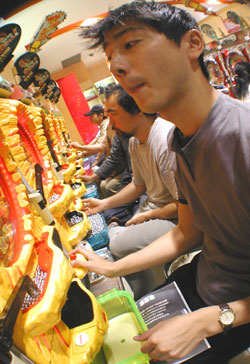i want to get into some pachinko...
 A few yards further down the alley, he steps into the front door of the parlor named Popeye. After shuffling down one aisle and making a turn to the left, he pauses and then breaks into a wide grin.
A few yards further down the alley, he steps into the front door of the parlor named Popeye. After shuffling down one aisle and making a turn to the left, he pauses and then breaks into a wide grin.He sees a hanemono, or "wing-type," machine.
"There are so many machines to choose from but I only use hanemono," says Kenichiro Nishi of his pachinko machine of choice in the world of - what amounts to - upright pinball gambling.
Nishi, 30, is a pachinko expert. His strategy for success revolves around money management and riding the wings of the hanemono. It has served him well during his years of attempting to wrestle what he can from this huge industry.
The theory is very basic: invest low amounts initially and don't get greedy.
The pachinko business in Japan is massive. Tallies for 2004 reveal that players sent nearly 30 trillion yen worth of balls (at a rate of 2.5 yen per ball) bouncing through the industry's machines. Maruhan, Japan's largest machine maker, had sales of 1.2 trillion yen for the fiscal year ending March 31, 2005. For comparison, Japan's leading broadcasting station, NHK, generated half that amount in the same period.
Though often linked to gangster activity and political corruption, this form of gambling is technically legal. Converting winning balls back to cash is done via a middleman at a satellite office away from the parlor. This additional step makes the swap back to cash legal. For those not interested in cash, patrons can swap balls for cigarettes, cosmetics or other luxury items on the parlor premises.


0 Comments:
Post a Comment
Subscribe to Post Comments [Atom]
<< Home